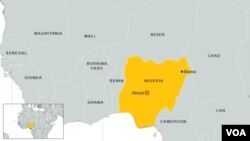ABUJA —
Nigeria's military said on Tuesday it had killed at least 50 Islamist rebels fleeing towards Cameroon in a battle in which 15 of its own soldiers and five civilians also died.
Nigerian forces have stepped up an offensive in the volatile northeast in the past few days, after Boko Haram fighters armed with grenade launchers and anti-aircraft guns attacked an army barracks in the town of Bama on Friday.
Boko Haram is fighting to revive a medieval Islamic caliphate in today's religiously-mixed Nigeria, a major oil producer and one of Africa's largest economies. The group rarely talks to the media but occasionally sends video statements anonymously.
The military often reports significant casualties among insurgents, while rarely admitting losses among its own troops or civilians.
The figures it gave for Monday's battle near the Cameroon border could not immediately be verified.
Defense spokesman Brigadier General Chris Olukolade said the military had targeted insurgents behind Friday's Bama attack and that 20 vehicles used in that raid had been spotted from the air and destroyed.
"Although a good number of the insurgents escaped with bullet wounds, while some have been arrested, over 50 of them died in the course of exchange of fire with ground troops in the operations to apprehend fleeing terrorists," he said.
Thousands have died violent deaths since Boko Haram launched an uprising 2009, but the past few months have been the most violent, with hundreds of civilians killed by the insurgents since August.
Some details on the toll from the Bama attack emerged from Maiduguri Teaching Hospital, the main mortuary for the region.
An attendant told Reuters Friday's attack left at least 20 soldiers dead. The military had not disclosed any death toll from the attack.
"There is no space left in the mortuary because the military brought in more than 20 dead soldiers killed in the Bama attack," the mortuary attendant, who declined to be named because he was not authorized to speak, said.
"These four were left on the floor as we're waiting for space to be created before we put them in," he added, gesturing to four bodies wrapped in shrouds.
President Goodluck Jonathan last month extended a state of emergency in areas worst affected by the insurgency.
The military began an offensive in May that initially drove the Islamists from large parts of the northeast, but they fell back into the hilly area of Gwoza, near the Cameroon border, from where they have launched deadly counter-attacks.
Boko Haram is still seen as the main security threat to Nigeria, Africa's leading energy producer.
The group claimed responsibility for a coordinated strike on Dec. 2 on the air force base and military barracks in the main northeastern city of Maiduguri in the first major assault on the heavily guarded city this year.
Nigerian forces have stepped up an offensive in the volatile northeast in the past few days, after Boko Haram fighters armed with grenade launchers and anti-aircraft guns attacked an army barracks in the town of Bama on Friday.
Boko Haram is fighting to revive a medieval Islamic caliphate in today's religiously-mixed Nigeria, a major oil producer and one of Africa's largest economies. The group rarely talks to the media but occasionally sends video statements anonymously.
The military often reports significant casualties among insurgents, while rarely admitting losses among its own troops or civilians.
The figures it gave for Monday's battle near the Cameroon border could not immediately be verified.
Defense spokesman Brigadier General Chris Olukolade said the military had targeted insurgents behind Friday's Bama attack and that 20 vehicles used in that raid had been spotted from the air and destroyed.
"Although a good number of the insurgents escaped with bullet wounds, while some have been arrested, over 50 of them died in the course of exchange of fire with ground troops in the operations to apprehend fleeing terrorists," he said.
Thousands have died violent deaths since Boko Haram launched an uprising 2009, but the past few months have been the most violent, with hundreds of civilians killed by the insurgents since August.
Some details on the toll from the Bama attack emerged from Maiduguri Teaching Hospital, the main mortuary for the region.
An attendant told Reuters Friday's attack left at least 20 soldiers dead. The military had not disclosed any death toll from the attack.
"There is no space left in the mortuary because the military brought in more than 20 dead soldiers killed in the Bama attack," the mortuary attendant, who declined to be named because he was not authorized to speak, said.
"These four were left on the floor as we're waiting for space to be created before we put them in," he added, gesturing to four bodies wrapped in shrouds.
President Goodluck Jonathan last month extended a state of emergency in areas worst affected by the insurgency.
The military began an offensive in May that initially drove the Islamists from large parts of the northeast, but they fell back into the hilly area of Gwoza, near the Cameroon border, from where they have launched deadly counter-attacks.
Boko Haram is still seen as the main security threat to Nigeria, Africa's leading energy producer.
The group claimed responsibility for a coordinated strike on Dec. 2 on the air force base and military barracks in the main northeastern city of Maiduguri in the first major assault on the heavily guarded city this year.












